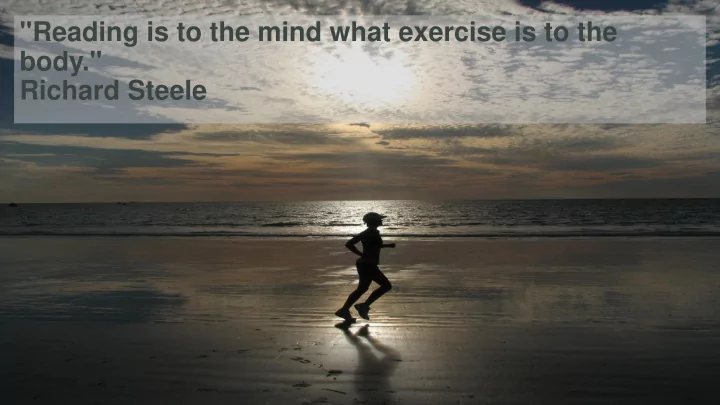

"Reading is to the mind what exercise is to the body." Richard Steele
How to improve your child’s reading at home Monday 9 th March 2020
So- Why read ?
Benefits of reading • Become a better reader • Reading is fun • Strengthens our brain • Children who read achieve better in school • Improve their vocabulary and language skills • Develops your child imagination • Increase your child’s ability to learn across all subjects • Help your child understand the world around them • Improves concentration and develop a longer attention span • Develop a child's independence and emotional development
Reading in the National Curriculum There are three main elements of reading within the National Curriculum: • Word decoding- c-a-t • Comprehension • Reading for pleasure This is across fiction, non-fiction and poetry.
How do children read? • Decode words- c-a-t • Word recognition • Predict through the pictures or text • Repetitive language- I can see a boat, I can see a van… • Tracking the text • Breaking words in to syllables or smaller words • Replacing words with a similar word
An extract taken from a computer manual According to the previous ATA/IDE hard drive transfer protocol, the signalling way to send data was in synchronous strobe mode by using the rising edge of the strobe signal. The faster strobe rate increases EMI, which cannot be eliminated by the standard 40-pin cable used by ATA and ultra ATA.
How does my child understand what they have read? • Predicting through their understanding of the text • Visualising- thinking about what they read and creating a picture in their head • Using their own experiences to link to their reading • Summarising - identifing the main of points of the text • Using their working memory - to remember what has happened in the story and retell in their own words • Using the clues in the text to work out how characters are feeling or what is happening • Asking questions and wondering about the text • Understanding grammar and vocabulary
What we do at Holy Cross The Teaching of Reading • Phonics • Accelerated Reader • Shared reading • Guided reading • Independent reading • Focused reading activities • Reading across the curriculum • Class novels and stories • Big up your book • Patron of reading/ Author visits • Celebrate reading
What is accelerated reader? Quiz on ipad 85% or more, moving up levels Points, words and books 25 minutes a day
What can I I do at h home to help my child? • Practicing the skills taught at school • Praise • A regular time slot to enjoy a book- reading to or listening to • A quiet, comfortable space giving your child your full attention • Promote a love of reading as a role model • Reading is everywhere- TV guide, instructions, magazines, newspapers, TV, travel brochures, letters and postcards • Ask questions and explain the meaning of new words • Pork pie library • Book bus • https://Ukhosted85.renlearn.co.uk/2048208/HomeConnect Recommended book list to take home
Possible questions to ask your child… Ask open ended questions for example… • What do you like about this book? • What do you think of this character? • Why do you think this is a good story? • What’s great about reading? • Why are you a good reader? • What is it about these stories that you like so much? Leaflets to take home
Reading to your child • Read them the book that was your favourite when you were a child. • Read slowly, with expression. Try to use different and funny voices for characters. • Talk about what is happening and what might happen next. Leave the story on a cliffhanger!
Michael Jordan can teach you to how to throw the perfect foul line shot, but if you don't ever practise the skill, his instruction is worthless. When students voluntarily read, they practise and enforce what is taught in the classroom.
A final thought: Those that read a book a week or more are likely to enjoy reading and do better in school
Activities … • Listen to your child read their reading book. • Have a go at a quiz on an ipad. • Look at the points, words and books that you have read so far!
• Before you go… • Please fill in an evaluation form and ask me if you have any questions. • Help yourself to a book • Thank you for coming
Recommend
More recommend